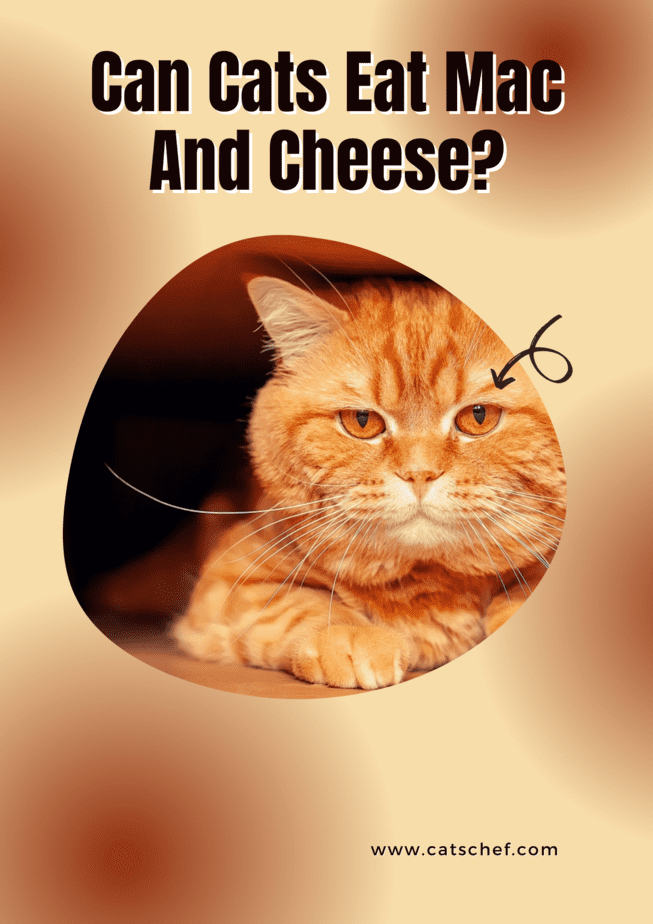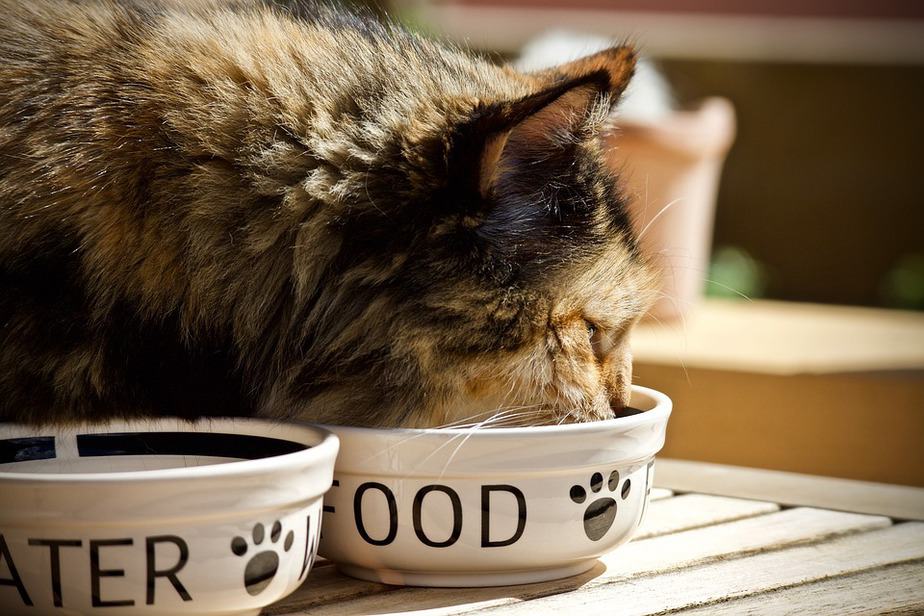We love food that’s prepared quickly, right? You can just never wait for mac and cheese to be done. This delicious pasta dish entices your furry friend’s senses too, but can cats eat mac and cheese? We know human foods differ from felines’, but just how much?
Your pet won’t eat her regular food and the stores are closed, what do you do now? You have some mac and cheese leftovers and are wondering if she can have some…
Mac and cheese is the abbreviation for macaroni and cheese, a famous American dish. Kids and adults alike are crazy about it. It’s a boiled or baked macaroni and cheese dish with a cheese sauce, usually cheddar.
Mac and cheese also comes pre-packaged, which makes our lives even easier! But if you want to make homemade mac and cheese yet you’re not the best chef out there, don’t worry. This dish doesn’t just excel in the flavor department, but it’s also a joy to prepare.
Can cats eat mac and cheese? Is it a safe option?
This meal isn’t inherently toxic to cats, but it does include some ingredients that could be harmful.
To humans, it appears to be a wonderful combination of macaroni and cheese. The type of meal where you try to impress your visitors, but all you have to do is combine everything and there you have it – a delectable meal!
It’s so delicious that one of the risks is becoming addicted to it! Aren’t we all aware of the negative effects of additional calories? Now, because of all of the ingredients in this caloric feast, let’s see if cats can eat mac and cheese.
Is there more to mac and cheese?
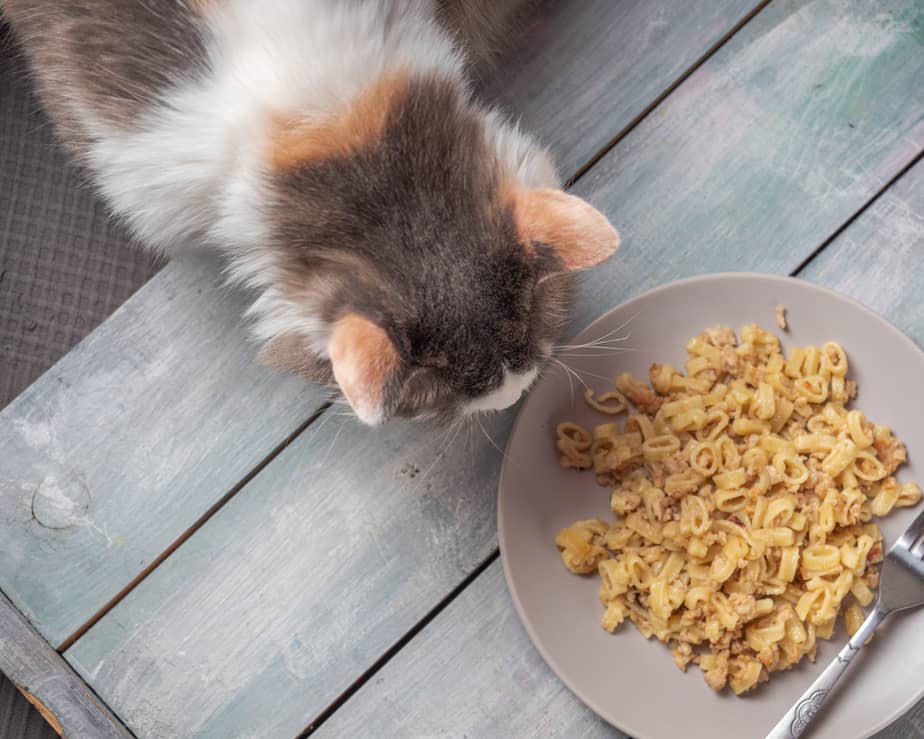
The name says it for itself, so the main ingredients are macaroni and some cheddar cheese sauce. Pasta makes up a great part of our lives and serves as the main ingredient in countless dishes. I mean, practically everything goes well with pasta!
Mac and cheese is pretty easy and quick to make. All you have to do is cook some macaroni and mix some butter, starch, and milk products. After that, add some spices, more shredded cheese, pop it in the oven, and you’re ready to feast!
This sounds all fun and games to us, but what about your pet that’s creeping up on you and your pot? Be sure to continue reading to find out whether you should share some of your mac and cheese with your furry friend.
1. Can cats eat pasta?
It appears that the boot-shaped country is constantly reminding us of its delicious and well-known cuisine. We often have a simple Italian-inspired supper consisting of pasta. Throw some pasta in boiling water and add spices, with or without anything else, and you have a meal!
Pasta makes life easier and more flavorful, and we owe it all to the Italians! But can cats eat the pasta mac and cheese since it contains pasta? If you notice your little chef hovering over your plate, you’ve probably asked yourself this question many times.
A modest portion should suffice, although it isn’t the healthiest option. Pasta is made up of three fundamental ingredients: flour, water, and eggs, all of which are generally safe for cats to ingest.
It’s high in carbohydrates, though, which your pet wouldn’t benefit from (apart from the additional weight).
This is owing to felines’ lack of a need for carbohydrate consumption. Your cat stands a strong chance of becoming overweight if you continue to feed her pasta.
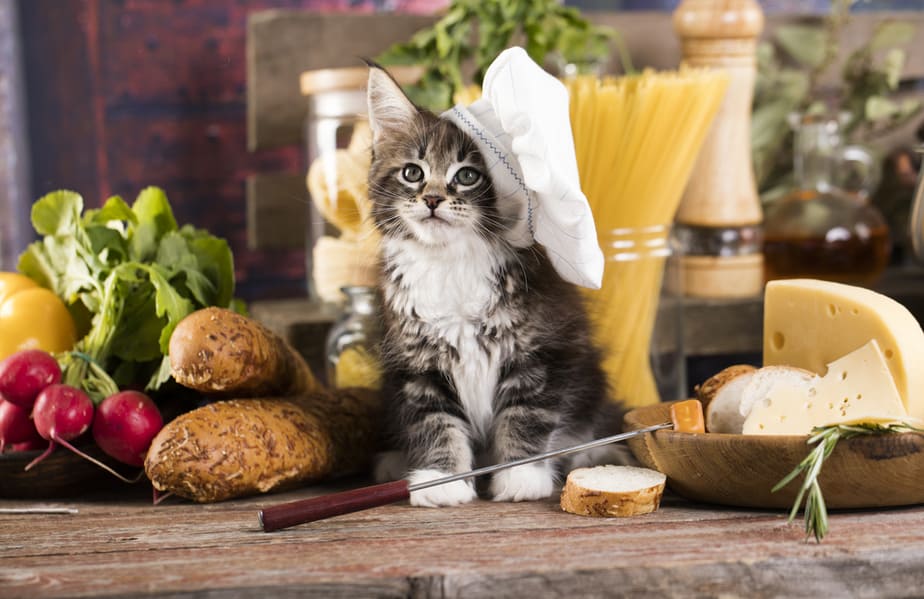
Sure, your floof is cute when she begs, but you know how difficult it is for chonkies to go through tight spaces! Your chubber doesn’t want to get stuck in the kitty door! Also, if she consumes these unhealthy carbs for an extended length of time, the extra pounds will put a strain on her joints.
This is a cause for concern, especially if you have an elderly cat. This can lead to arthritis and even diabetes in some circumstances. Control your pet’s pasta intake to keep her healthy and satisfied. This means only a random nibble every now and then. Make sure it doesn’t become a habit!
Raw pasta is off-limits for cats. Uncooked macaroni can get stuck in her throat and sharp spaghetti in her palate. It can also cause obstructions in the digestive tract.
2. What about cheese?
Cats are lactose intolerant, which means they have a hard time digesting dairy. Although cheese has less lactose than milk, this does not mean your cat can or should eat it.
Of course, she is unlikely to acquire symptoms from a few little nibbles, just as she’s unlikely to develop symptoms from one bite of pasta. However, if she continues to eat cheese, she’ll start to show signs of gastrointestinal issues. Your pet may have bloating, diarrhea, and gas as a result of her lactose intolerance (not a pleasant experience!)
Just like sour cream, cheese is high in lipids, which is why your cat is drawn to it. In addition to protein, felines require a certain amount of fat to sustain their bodies. Fat is an energy source, but it may be causing problems in this case. Saturated fats, such as those found in cheese, are bad.
These fats boost cholesterol levels in the bloodstream, increasing the risk of heart disease and stroke. Leave the cheese to the mice and keep bad fats out of your cat’s diet!
It’s probably unnecessary to mention how excess fat leads to obesity. A balanced diet is what your pet needs to live a long and healthy life. Therefore, you should weigh your options closely when it comes to your pet’s desires and health.
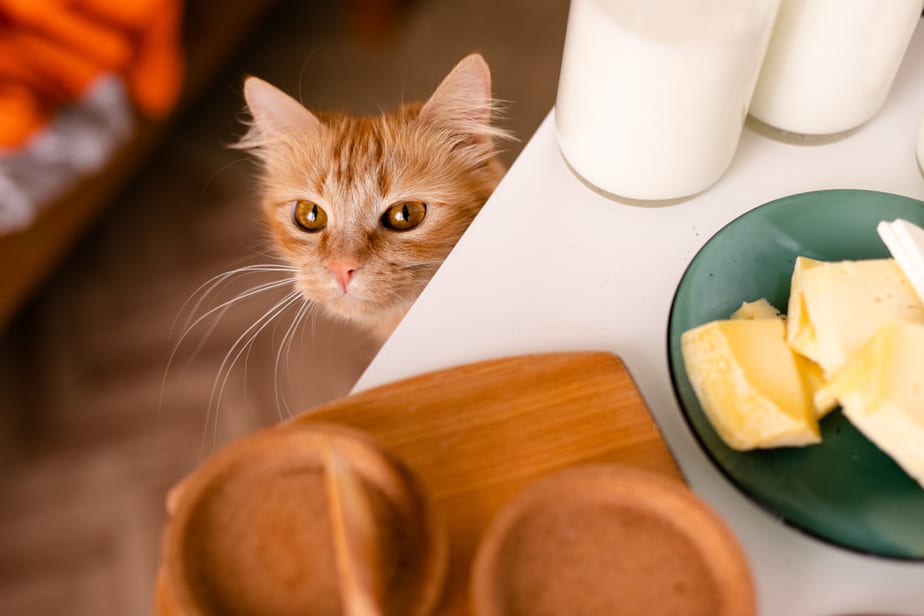
3. Can cats eat the butter and milk found in mac and cheese?
The cheddar cheese sauce contains milk and butter – and we all love a good chunk of this sauce over the macaroni!
However, as explained earlier, dairy products aren’t welcomed in the feline world as cats are lactose intolerant. If your pet consumes butter or milk, she may experience the same symptoms as some humans.
A few licks here and there are unlikely to hurt her. Nonetheless, there’s no reason to encourage her to try it.
Cats lack an enzyme called lactase that aids in the digestion of lactose, a sugar present in milk. If you’re not sure if your pet is lactose intolerant, there are certain signs that can help you figure it out. Bloating, stomach pain, vomiting, and diarrhea are all symptoms to look out for.
This isn’t to say that if your cat takes a fast lick of your butter, you should expect to see these symptoms. These negative effects are unlikely to occur in small doses. Again, each cat is unique, so you might be the lucky owner of a lactose-intolerant kitty.
Some symptoms of lactose intolerance and dairy allergy are similar. Diarrhea, bloating, and vomiting, for example, are symptoms of both lactose intolerance and an allergic reaction.
However, skin rashes, swelling of the lips, and even respiratory difficulties are indicators that your cat has a dairy allergy. All of them are reasons to be concerned and seek quick veterinarian assistance. If your cat’s allergic to dairy, you may want to hide margarine as well.
4. What about herbs and spices?
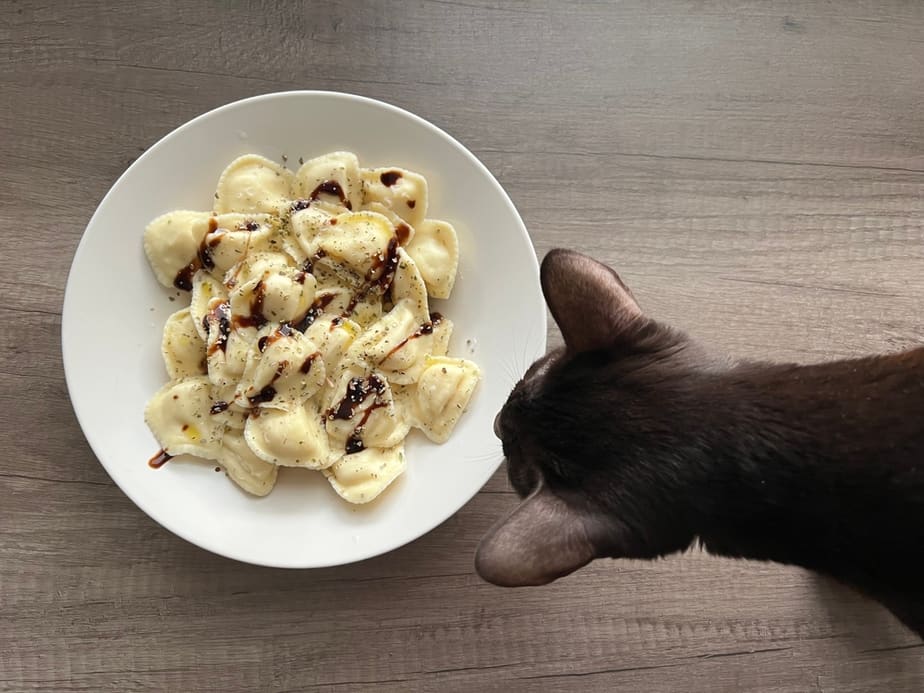
When it comes to cats eating this tasty combo, spices and other ingredients must be avoided. Salt, garlic, and other spices are among the most frequently used and may harm your cat’s health.
Garlic in particular is a significant cause for concern. This member of the Allium plant family is extremely harmful to your cat’s health. It’s especially dangerous to felines because it contains toxins that enter the bloodstream and damage and destroy red blood cells, causing anemia to develop quickly.
Whether cooked or raw, powdered or chopped, garlic is poisonous. It’s one of the biggest reasons your pet should avoid lasagna, too.
Black pepper is fine to consume in smaller amounts, but anything beyond that shouldn’t be allowed.
Mac and cheese goes well with just about any condiment, but one of the most popular used with this dish is ketchup. Unfortunately, ketchup isn’t harmless to felines and should be avoided. Just like mustard, it contains ingredients that are considered dangerous to your cat’s health.
Nutritional value
Can cats eat mac and cheese for its nutritional value? Sorry to say, but this dish won’t help your furkid in any manner. Furthermore, if consuming this dish becomes a habit, it may be harmful to her health.
Foods other than meat aren’t processed as well by cats. This means they aren’t able to fully access the nutrients in non-animal-derived foods.
In the wild, cats will consume the fattest sections of their capture first, therefore fat is a crucial part of their diet. This gives them a source of energy to keep their bodies working and warm them up.
So where does that leave fats found in mac and cheese? Should cats be allowed to eat them?
In short, no. Saturated fats aren’t good for your cat. These fats are harmful and can raise blood cholesterol levels.
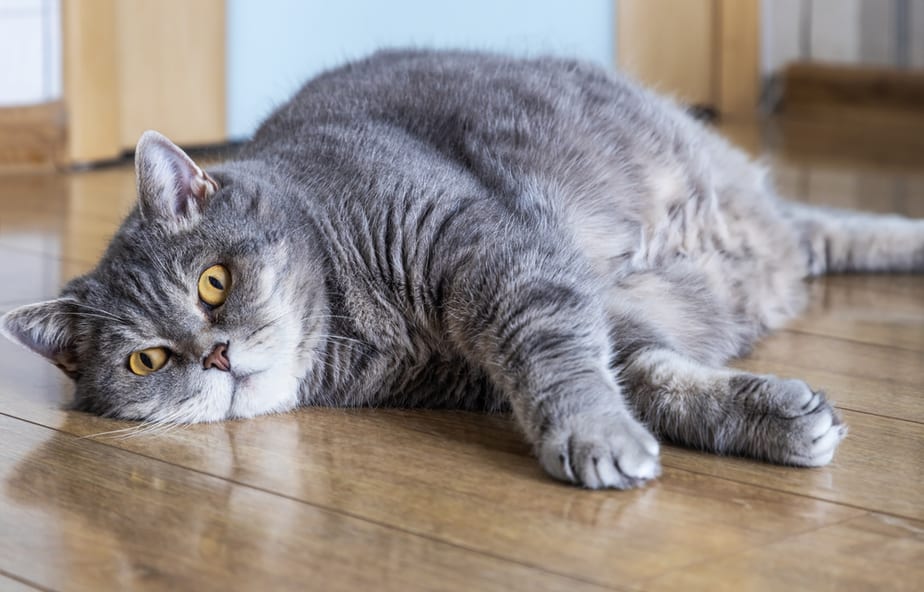
This increases the risk of heart disease and stroke. Not to mention obesity that comes with a high-fat diet. You’re presumably already aware of this.
Carbs are another nutrient that might have comparable effects on your cat. Carbohydrates are not essential to your cat’s diet, and an excessive amount, like fat, can be a cause for concern.
Mac and cheese is high in calories, therefore, it’s not the best treat for cats. Increased fat storage is the result of eating too many calories. This will lead your cat to gain weight, which in turn puts pressure on her joints. This added pressure could be the foundation for developing arthritis.
Final thoughts
You came here because you wondered whether cats can eat mac and cheese. With a detailed explanation, we have provided you with the answer: Unfortunately, mac and cheese isn’t the best dish to serve your feline.
Pasta is a source of carbs that doesn’t benefit your cat. Moreover, it can have negative effects on her health. Cheese is dairy that is bad news for lactose-intolerant pets like cats. We’re sure your cat’s nagging you about the leftovers, but don’t give in to those whimpering whiskers!
